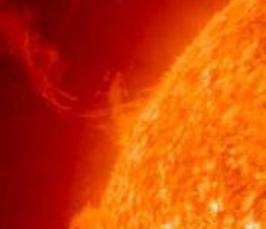ESP Online Seminar: Counter-streaming Flows of a Giant Solar Filament as Observed in the Extreme Ultraviolet (A. Dierke)
ESPOS
- Date: Apr 19, 2018
- Time: 11:00 AM - 12:00 PM (Local Time Germany)
- Speaker: Andrea Dierke
- Leibniz Institut for Astrophysics Potsdam (AIP)
- Location: Leibniz Institute for Astrophysics Potsdam (AIP) broadcasted on MPS
- Room: Aquila, Bootes, Cygnus
- Host: Andreas Lagg

A giant solar filament was visible on the solar surface between 8-23
November 2011. The filament stretched over more than half a solar
diameter. Multi-wavelength data from the SDO instrument AIA (171, 193,
304, and 211 Å) were used to examine counter-streaming flows within the
spine of the filament. H-alpha images from the Kanzelhöhe Solar
Observatory provided context information. We applied local correlation
tracking (LCT) to a two-hour AIA time series from 16 November 2011 to
derive horizontal flow velocities of the filament. To enhance the
contrast of the AIA images, we employed noise adaptive fuzzy
equalization (NAFE), allowing us to identify and quantify
counter-streaming flows in the filament. We detected counter-streaming
flows in the filament, visible in the time-lapse movies of all the
examined AIA wavelength bands. Using time-lapse movies we found that
these persistent flows lasted for at least two hours. Furthermore, by
applying LCT to the images we clearly determined counter-streaming flows
in time series of 171 Å and 193 Å images. In the 304 Å wavelength band
we found only minor indications for counter-streaming flows with LCT,
while in the 211 Å wavelength band the counter-streaming flows are not
detectable. The average horizontal flows reach mean flow speeds of 0.5
km/s. The highest horizontal flow speeds are identified in the 171 Å
band with flow speeds of up to 2.5 km/s. The results are averaged over a
time series of 90 min. Because the LCT sampling window has a finite
width, spatial degradation cannot be avoided, leading to lower estimates
of the flow velocities as compared to feature tracking or Doppler
measurements. The counter-streaming flows cover about 15-20% of the
whole area of the EUV filament channel and are located in the central
part of the spine. In conclusion, we confirm counter-streaming flows are
omnipresent also in giant quiet-Sun filaments.